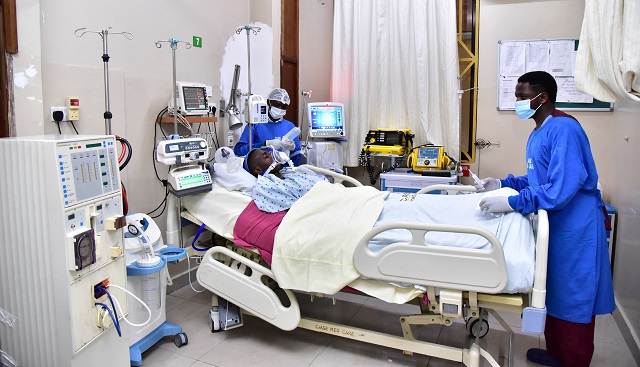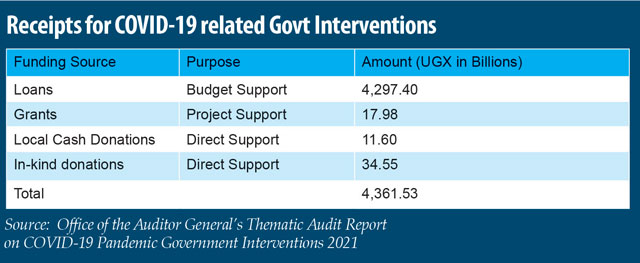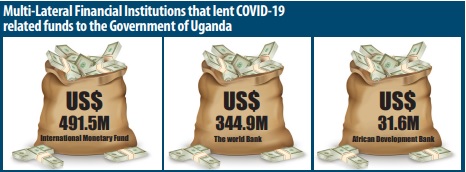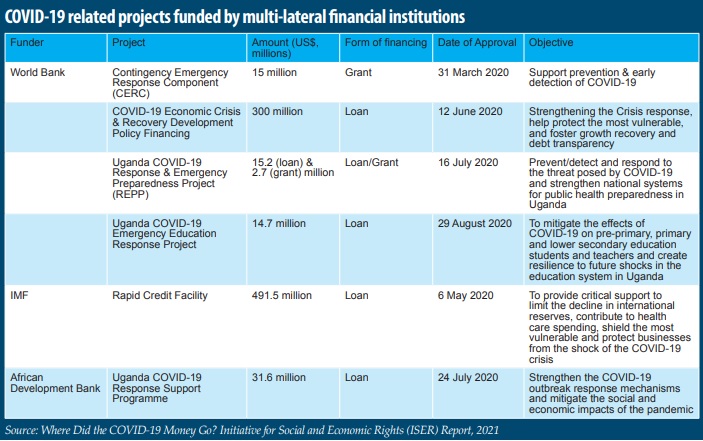
Civil Society actors want Govt to rethink funding approach to tackle country’s emerging health security threats
Kampala, Uganda | RONALD MUSOKE | Four years since the Uganda government went on a borrowing spree in its response towards the COVID-19 pandemic, civil society actors insist the government must fully account for all the funds it got from grants, donations and loans.
According to forensic reports on the COVID-19 pandemic government interventions which have been published since March, 2021, by the Office of the Auditor General, in a space of about 12 months, the government received about Shs 4.4 trillion to fight COVID-19 but also resuscitate the economy.
Most of this money (about Shs 2.88 trillion) came in form of loans from the World Bank, the African Development Bank and the International Monetary Fund and will have to be repaid by all Ugandans in future.
John Muwanga, the Auditor General, noted in his first thematic report produced in March 2021 that most of the funds were disbursed by the Treasury to 134 districts and 11 ministries, departments and agencies. He, however, noted that although the government had taken measures to respond to the pandemic, a number of short comings were observed in the way the funds were used.
Muwanga said there was not only under absorption of funds but there was non-compliance with procurement laws. As a result, substantial amounts of funds went unaccounted for while up to 4% of the funds “were diverted,” meaning they were never deployed to do the things they were meant for.
Civil society representatives who have talked to The Independent for this story say, although it has become normal for Ugandans to move on quickly, the government must account for all the funds it borrowed under the pretext of fighting the pandemic. They also want all government official who were implicated in the misuse of the funds to face the full force of the law.

Peter Wandera, the Executive Director of the Uganda Chapter of Transparency International told The Independent that considering the Auditor General has conducted several audits into the use of COVID-19 funds and found several anomalies, the government must revisit the reports and implement the Auditor General’s recommendations.
“The Auditor General gave some concrete recommendations. How far has the government gone to implement these recommendations? There are officials who were implicated in the Auditor General’s reports; have these officials been indicted?”
“How have public accountability and transparency agencies such as the Inspectorate of Government and the PPDA together with the line ministries responded to the the Auditor General’s reports in terms of plugging the holes he flagged?”
Wandera says this is important because the failure to discipline government officials who were found culpable would mean that the same people will continue creating the same anomalies in public finance accountability processes.
The Independent reached out to the Inspectorate of Government asking whether the Ombudsman has done any investigations on the government entities and officials that the Auditor General has implicated in his reports. Without giving substantial detail, Munira Ali, the Strategic Partnerships and Public Relations Officer at the Inspectorate of Government confirmed to The Independent that “the Inspectorate of Government has been conducting several investigations into the COVID-19 funds and a report is being finalized.”
Whether Munira was serious or not with her response, civil society representatives who monitor public health funding in the country insist the government must strengthen and streamline accountability mechanisms that promote efficiency and hold duty bearers accountable.
“As far as the health sector is concerned, every little money meant for this sector is intended to improve the situation but when it is not efficiently utilized, it dents the health system strengthening efforts,” said Kenneth Mwehonge, the Executive Director of the Coalition for Health Promotion and Social Development (HEPS-Uganda), a Kampala-based health rights non-profit.
According to civil society activists, the failure to account for COVID-19 funds to Ugandans has an implication on public trust which in turn will affect the government’s ability to mobilize resources and to ensure adherence of the population to epidemic preventive measures in future.
“It’s now known that epidemics will be with us for many years but we seem never to have learnt from the COVID-19 pandemic,” said Onesmus Mugyenyi, the Deputy Executive Director of the Advocates Coalition on Development and Environment, a Kampala-based public policy thinktank.
‘COVID-19 was the pandemic of our times’
The World Health Organization (WHO) declared COVID-19 a “public health emergency of international concern” on Jan.30, 2020, and six weeks later, the UN health agency upgraded the disease to pandemic level on March 11.
Uganda would confirm its first COVID-19 index case on 21 March. President Yoweri Museveni moved first to protect lives and to contain the spread of the virus. He immediately launched a fundraising campaign to help government mobilize resources.

He welcomed donations but also mobilized other resources through grants and loans to facilitate response activities. By the end of the year, the government had marshalled close to Shs 4 trillion for COVID-19 response activities according to records from the Office of the Auditor General.
The response measures were designed as a wholesome government approach involving key stakeholders, including the Cabinet, Parliament, Local Governments and security actors among others who executed their roles under the technical leadership of the Ministry of Health and overall oversight of the Office of the Prime Minister.
But, since most of the implementation of the response was done during an emergency period, the Auditor General found several anomalies in the way the COVID-19 funds were utilized. He attributed some of the shortcomings to the emergency conditions under which the entities were operating and the lockdown measures instituted by the government to control the spread of the disease.
Some of these restrictions, for instance, saw Parliament operate at barely half its capacity. In a country that has been struggling to rein-in corruption among public officials, public spending during the pandemic became a challenge.
Indeed, by August, 2021, MPs were calling for an audit of all the COVID-19 Funds. In its report to Parliament in August 2021, the Parliamentary Task Force on the National Covid-19 Response recommended a forensic audit into the Shs4 trillion that was meant to fight the COVID-19 pandemic since its onset in March 2020.
Since then the Auditor General has done both thematic and forensic investigations into the COVID-19 fund expenditures but the public is yet to see action on some of the recommendations the Auditor General has made.
“No doubt, the COVID-19 pandemic was the biggest public health challenge of our times; it was unprecedented and it shocked the world including Uganda,” says Dr. Denis Kibira (PhD), the Chief Executive Officer of DUMAIC Global Health, a non-profit that promotes transparency and accountability among state and non-state actors to strengthen the health system and more effectively respond to the country’s health challenges to attain national and global health targets and commitments.
Dr. Kibira told The Independent that at the time, the government did the right thing to get the financial resources, including the loans. “Any government would have done the same thing to cope with the situation,” he told The Independent.
Mwehonge of HEPS-Uganda agrees. However, he says, the Covid-19 pandemic in Uganda exposed structural gaps in government. At so many levels, the COVID-19 pandemic caught the government flat-footed, he says.
“At the pandemic onset, everything was sent into panic mode; that is why many structures, and procedures (like Parliamentary scrutiny on borrowing) had to be overlooked as the government struggled to cope with the situation.”
Mwehonge says for countries that had strong health systems and mechanisms to ensure efficiency in utilization of funds, they got value for money from the borrowed funds and donations. On the other hand, countries like Uganda that have been grappling with accountability inefficiencies as highlighted by Auditor General reports over the years, got entangled in a complex tragedy of an epidemic triggering excessive borrowing, inefficiencies in accountability and a soaring national debt.
“This is a tragedy that will last for years even after the COVID pandemic,” he told The Independent, “Uganda – just like other low-income countries relies on donor support and this comes with accountability-related conditionalities. Therefore, accountability inefficiencies affect future partnerships and support from the development partners.”
Govt accountability deficit
In April, last year, the Human Rights and Peace Centre (HURIPEC), a department of Makerere University’s Law School launched a report after a one-year study on transparency and accountability concerns over the management and oversight of COVID-19 funds in Uganda.
According to the report, the rising need for transparency and accountability initiatives for COVID-19 funds reflects limitations of institutional mechanisms to make government accountable for use and management of resources for health emergencies.

The report which focused on institutional oversight of both state and non-state actors in management of COVID-19 funds noted that while Uganda had elaborate statutory instruments for oversight, the national response framework for COVID-19 dealt with multiple challenges including lack of transparency, ambiguities in procurement to accountability deficits.
It also noted that the government’s response to the COVID-19 was over shadowed by instances of waste, mismanagement, and blatant, corruption. “Issues like delayed disbursements, unlawful procurement, political use of monetary and other reliefs, diversion of funds and information deficits led many districts to deal with the pandemic in their own ways in spite of the many guidelines,” the report noted in part.
Dr. Zahara Nampewo (PhD), the Principal Investigator of the research said lessons from the COVID-19 pandemic should be viewed as an opportunity to learn and adopt concrete measures for dealing with health and other related emergencies.
Among its many recommendations, the report urged the government to establish a commission of inquiry to examine the COVID-19 response and impact of the pandemic so as to produce a factual narrative account on the management of any public health emergency.
Julius Mukunda, the Executive Director of the Civil Society Budget Advocacy Group (CSBAG), a coalition of local and national civil society organizations that work to influence government policies on resource mobilization and utilization for equitable and sustainable development of the country told The Independent that if the government fails to act, it would mean that “the government learnt nothing and forgot nothing.”
“We, for instance, borrowed money which we were unable to utilize in terms of buying vaccines and we are now going to destroy them,” Mukunda said, referring to a recent Office of the Auditor General which noted in January, this year, that the government intends to destroy close to 5.6 million doses of Covid-19 vaccines, purchased through a World Bank loan. The vaccines, the Auditor General noted, are valued at Shs 28.1 billion (US$7.3m) but have since expired.
Mugyenyi of ACODE agrees with Mukunda.
“The sad thing is that these loans we have borrowed have failed to be very well utilized. When we get this money, we just squander it and yet the borrowing has not stopped. We need to get this money and deploy it in the right areas of development.”
“We have borrowed so much and now the government is dedicating 30% of the national budget to debt repayment. Out of the remaining 70%, about 40% goes into recurrent expenditure and what’s left is what goes into development financing.”
According to a report titled, “Where Did COVID-19 Money Go?” which was published in June 2021 by the Initiative for Social and Economic Rights (ISER), a Kampala-based non-profit, Uganda’s public debt has risen to “epic proportions” and a substantial amount of this debt was taken during the COVID-19 period.
For instance, the country’s debt rose by Shs 16.82 trillion (32%)) in a space of one year to Shs 65.82 trillion (47.2%) of GDP in December 2020 from Shs 49 trillion (38% of GDP) at the end of 2019.
The World Bank and the International Monetary Fund (IMF) predominantly provided loans rather than grants for their COVID-19 response. For example, out of the US$ 868 million from the international financial institutions which funded Uganda’s COVID-19 prevention and preparedness plan, 99.7% was in form of loans and only US$ 2.7 million (0.3%) was in form of grants.
Civil society representatives say Ugandans should be worried about a looming debt crisis, especially when you consider the fact that loans do not always go to measures that benefit the ordinary Ugandans yet it is these very Ugandans who will have to pay the loans back.
The report argues that the IMF loan which went to replenishing the country’s foreign exchange reserves and financing the Uganda Development Bank’s strategic plan should not have been considered a substantive response to the COVID-19 crisis yet this loan will still burden people whose immediate needs it did not serve.
Preparing for the next pandemic
Going forward, Mugyenyi of ACODE says the government must move now to put in place robust mechanisms to prepare for these public health emergencies when they strike.
For Mwehonge of HEPS-Uganda, although civil society commends the government for the efforts to respond to health emergencies and strengthen accountability in Uganda, the government should rethink the funding approach to health security threats like pandemics, outbreaks and epidemics and increase health sector investment.
“The government must commit and allocate funds in every financial year budgets for health systems strengthening, health disasters preparedness, prevention and response – rather than heavily relying on development partners to step in when health emergencies occur.”
“We also advocate for the Uganda National Health Insurance Scheme as one of the sustainable health financing mechanisms that will contribute to the attainment of the Universal Health Coverage goal,” he told The Independent.
 The Independent Uganda: You get the Truth we Pay the Price
The Independent Uganda: You get the Truth we Pay the Price



